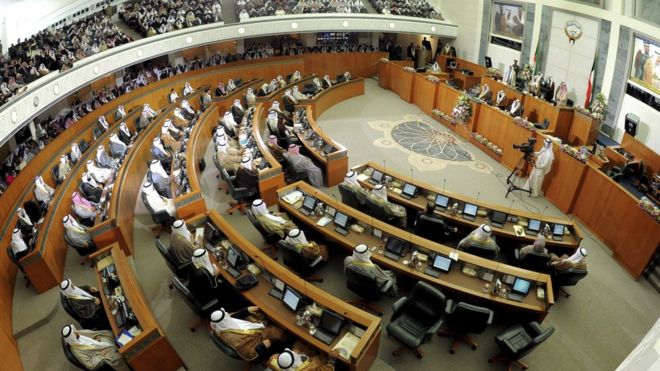How Long Can the Deadlock in Kuwait’s Parliament Last?
Kuwait’s government is facing major parliamentary challenges in response to efforts to impose economic austerity. This conflict has been playing out since December 2016 when the new parliament, in which the opposition won nearly half of the 50 seats, was seated.

Published by The Lawfare Institute
in Cooperation With

Kuwait’s government is facing major parliamentary challenges in response to efforts to impose economic austerity. This conflict has been playing out since December 2016 when the new parliament, in which the opposition won nearly half of the 50 seats, was seated. Since then, the opposition has railed against the government’s plans to raise consumer prices on fuel, electricity, water, and food staples. While Kuwait’s parliament is designed to create policy deadlock, the austerity debate now taking place in Kuwait has changed the stakes of stalemate and created an unsustainable status quo for Kuwait’s government.
Kuwait’s parliament operates in accordance with Chapter III of Kuwait’s 1962 constitution. While the constitution was suspended in 1986, popular opposition in the form of a Constitutional Movement led to its reinstatement following the 1991 Gulf War. Since then, the constitution has been the foundation of a legislature with more influence than those in other Gulf monarchies. However, its articles protect royal family interests in addition to those of key Kuwaiti elites. As scholars like Michael Herb point out, Kuwait’s governing institutions are designed to encourage political deadlock by balancing political constituencies against each other. The country’s 50-seat parliament consists of key stakeholders upon whose assent the ruling family relies to stay in power. While political parties are illegal in Kuwait, the parliament includes liberal, Islamist, tribal, urbanite, and loyalist factions. These factions can restrain government policy through votes of no confidence, interpellation, and denying the government a reliable majority. In turn, the multitude of factions usually makes it difficult for opposition factions to align on policy. For example, Islamist MPs frequently try to limit holiday displays during Christmas to make Kuwaiti society reflect a more Islamic character, but they are usually rebuffed by secular urban MPs who cite a history of religious tolerance in the country. The existence of so many factions in parliament means that these various factions’ policies often cancel each other out. This institutional structure allows the government to carry out its agenda—within limits—while also giving voice to these constituencies.
While there are still splits among different opposition factions, they have consolidated around issues of corruption and rolling back austerity.
This balance began to slip as a tribal/Islamist faction gained strength after Iraq’s 1990 invasion of Kuwait and the 1991 Gulf War. It has come to dominate Kuwait’s opposition, and made a strong showing in the February 2012 elections. These elections were declared invalid by Kuwait’s constitutional court in July 2012, and that October the government implemented electoral changes restricting each Kuwaiti to voting for one candidate rather than four. In response, many opposition members boycotted elections in December 2012 and again in July 2013. Their subsequent absence from the parliament limited their influence over austerity measures that Kuwait’s government began implementing in September 2016 in response to a budget shortfall caused by the global decline in oil prices. This drop had major economic and political effects in Kuwait, where oil accounted for 38.5 percent of GDP in 2015. In October 2016, Kuwait’s emir dissolved parliament and early elections were called in an attempt to consolidate government power and ease the implementation of austerity measures. However, opposition candidates did not boycott as they had in 2012 and 2013. Through participation in elections and campaigning on reversing austerity measures, they won nearly half the parliamentary seats.
While there are still splits among different opposition factions, they have consolidated around issues of corruption and rolling back austerity. The government has come under strong pressure to put an economic squeeze on expatriates as well. Since being seated in December 2016, Kuwait’s parliament has achieved a reduction in the extent of electricity price hikes, as well as the resignation of the minister of youth and information and undersecretary of the Ministry of Health. In an attempt to strike a “grand bargain” with Shi’a and liberal opposition members, Kuwait’s emir promised to reinstate the citizenship of opposition figures from whom it had been revoked. However, opposition members continued pressuring the government and claimed it was deliberately delaying reinstating the citizenship of several individuals.
Parliamentary deadlock is usually a useful strategy for Gulf monarchies. It mitigates the influence democratically-elected lawmakers can have over policy while coopting major factions by giving them a seat at the table, and thus responsibility, for policymaking decisions. But Kuwait’s government underestimated the opposition’s showing in elections and the new balance of power in parliament has reduced the dividends of a divided legislature. This unexpectedly large and united opposition has overcome internal divisions and factionalism because of the widespread popular opposition to austerity, which is at the heart of the government’s current agenda. As a result, the government has not only been unable to implement austerity, but has also needed to roll back certain measures already put in place. Despite these reversals, the opposition’s strength and voracious appetite for confrontation has been, up until this point, within the general boundaries of acceptability from the government’s perspective.
Kuwait’s government underestimated the opposition’s showing in elections and the new balance of power in parliament has reduced the dividends of a divided legislature.
Recent events may indicate that this confrontation is starting to reach its limits. Two weeks ago, two separate panels of opposition members questioned Prime Minister Jaber al-Mubarak al-Ahmad al-Sabah. The questioning lasted 13 hours. Interpellations are a way for the opposition to embarrass ministers and raise the political costs to the government of advancing a policy. In this case, the government was able, by majority vote, to hold the interpellations in a closed session; the MPs holding the hearings also failed to pass motions of non-cooperation. However, the greater significance of this interpellation was its target: Prime Minister Jaber al-Mubarak was appointed to his office in 2011 by the emir, who is his half-uncle (which makes Mubarak a fairly close relation in the country’s 1,200-member strong royal family). Following the questioning, the emir praised the prime minister’s performance but urged constructive cooperation between the executive and legislative branches. This response indicates that the emir did not take kindly to this interpellation and the extent to which it was a show of opposition force against government austerity policy.
Criticism of the royal family has always been sensitive in Kuwait and criticism of the emir himself is illegal. In April 2017, MP Musalem al-Barak was released from prison after a two-year sentence for insulting the emir in a speech. Criticism in the current parliament has thus far avoided criticism of the royal family itself. However, interpellations, foot-dragging, and criticism of the leadership’s policies create an untenable situation for Kuwait’s leadership. Given that Emir al-Sabah is 87 years old and a scuffle for the role of crown prince will likely following his passing, instability and deadlock are particularly risky for the royal family at the moment.
MPs know the boundaries of discourse in Kuwait and will likely not cross any red lines. However, anti-austerity pressure will have a greater effect on the royal family’s interests the longer it persists. Working in their favor is the fact that popular sentiment will not take kindly to months of opposition speeches with no economic relief. At the same time, weakening the opposition will have little effect on the underlying grievances that austerity has caused for many in Kuwait. The government will need to apply its normal tools of governance in new ways to navigate the political chaos of the current moment. Such a strategy could involve a combination of carrots and sticks. The government could offer to slow the pace of austerity and make key concessions, like instating an opposition-supported expat remittance tax that would have little economic effect but would please some members of parliament. Coupled with efforts to coopt some opposition members and fracture the remaining constituencies using wedge political issues, the government could ease the current parliamentary deadlock. In attempting to implement this strategy, however, the government faces an opposition that is seasoned, strategic, and has wide popular support.





